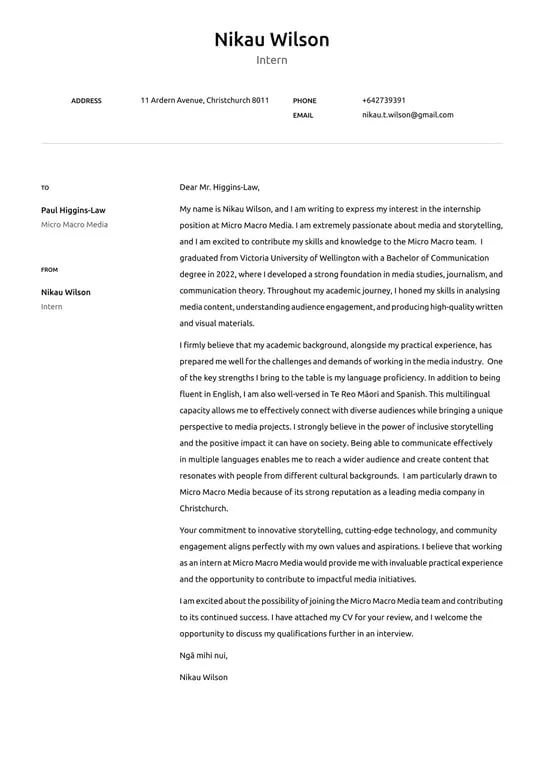Why a Cover Letter is Crucial for Internship Applications
In the competitive world of internship applications, a well-crafted cover letter can be your secret weapon. It serves as your first introduction to a potential employer, providing an opportunity to showcase your personality, skills, and passion for the role. Unlike a resume, which lists your qualifications, a cover letter allows you to tell a story, explaining why you are the ideal candidate for the specific internship. It’s a chance to demonstrate your understanding of the company, your enthusiasm for the industry, and your ability to communicate effectively. A strong cover letter can make you stand out from the crowd, increasing your chances of securing an interview and ultimately, landing the internship you desire. Without it, you risk being perceived as just another applicant, potentially missing out on valuable opportunities.
Highlighting Your Skills
Your cover letter is the perfect place to spotlight your key skills and explain how they align with the internship’s requirements. Don’t just list your skills; provide specific examples of how you’ve utilized them in the past. If the internship requires strong communication skills, share an instance where you successfully led a team project or presented to a large audience. If analytical skills are important, describe a time when you used data to solve a problem or improve a process. Quantify your achievements whenever possible. Instead of saying “Improved customer satisfaction,” say “Increased customer satisfaction by 15% through implementing a new feedback system.” By providing concrete examples and quantifiable results, you demonstrate the value you can bring to the internship and make a more compelling case for your candidacy. Always tailor your skills to match what the job posting requires and use relevant keywords to increase your chances of getting noticed.
Showcasing Relevant Experience
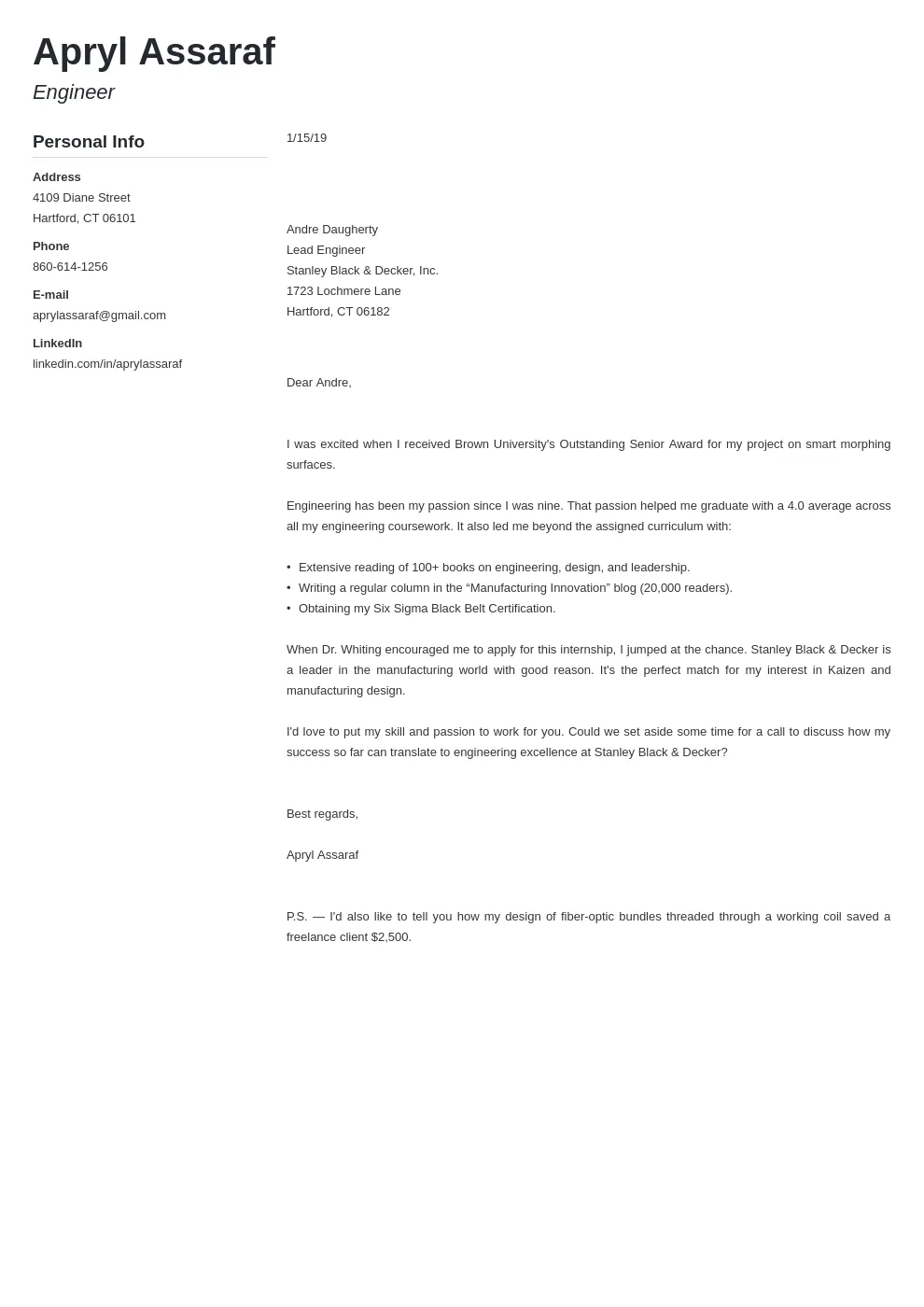
Even if you lack extensive work experience, your cover letter allows you to highlight relevant experiences that demonstrate your capabilities. This could include academic projects, volunteer work, extracurricular activities, or personal projects. For instance, if you’re applying for a marketing internship, describe a marketing campaign you managed for a club or a website you designed to promote a cause. If you’re interested in a technical role, discuss a coding project you completed or a software program you mastered. Focus on the skills you gained and the impact you made. Don’t be afraid to showcase your passion and initiative. Explain what you learned, the challenges you overcame, and the results you achieved. By doing so, you’ll demonstrate your ability to apply your knowledge and your eagerness to learn and grow in a professional setting. Always link back your experience to the role you are applying to.
Tailoring to the Specific Internship
Generic cover letters are easily spotted and often discarded. To truly impress, customize your cover letter for each internship application. This means carefully researching the company, understanding the internship’s requirements, and aligning your skills and experiences accordingly. Mention the specific projects or initiatives that excite you about the role, and explain why you are particularly interested in that organization. Demonstrate that you’ve taken the time to understand their values, mission, and culture. By showing that you’ve put in the effort to tailor your application, you signal your genuine interest and make a stronger impression. This level of personalization shows that you’re not just applying for any job, but that you are genuinely excited about this specific opportunity. Make sure you use keywords from the job description.
Key Components of a Compelling Internship Cover Letter
Contact Information and Date
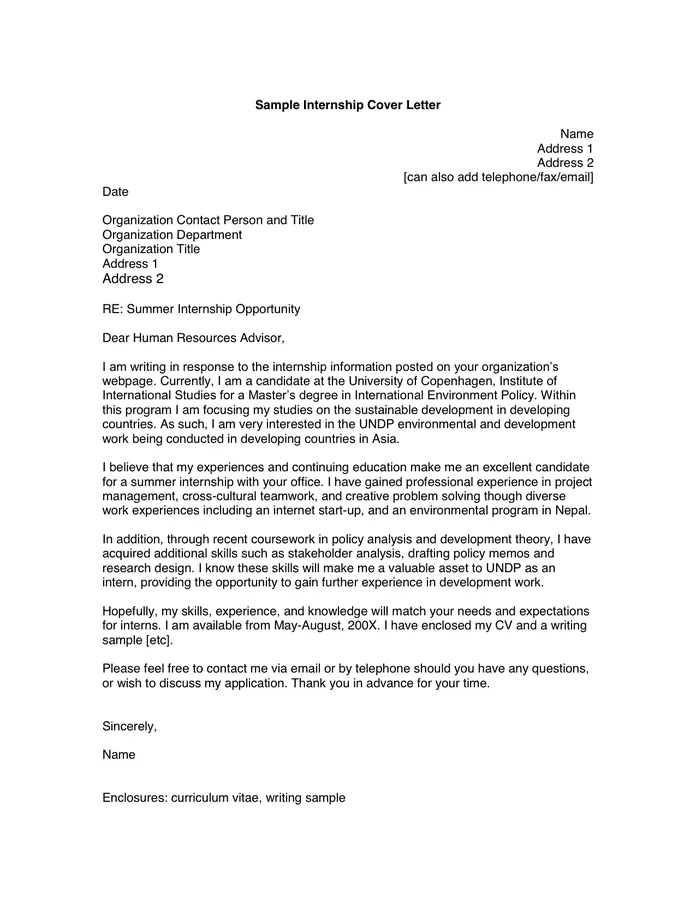
Start your cover letter with your contact information (name, phone number, email, and possibly LinkedIn profile URL) at the top. Include the date below your contact information. This allows the hiring manager to quickly identify you and know when the letter was written.
The Salutation
Address the hiring manager by name whenever possible. Research the company to find out who will be reviewing applications. If you can’t find a specific name, use a professional salutation such as “Dear Hiring Manager” or “Dear [Department Name] Team.” Avoid generic greetings such as “To Whom It May Concern.”
Opening Paragraph Grab Their Attention
Your opening paragraph should immediately grab the reader’s attention. State the specific position you’re applying for and how you learned about it. Briefly highlight your most relevant qualifications and express your enthusiasm for the opportunity. Consider starting with a compelling anecdote or a statement that reflects your understanding of the company’s mission.
Body Paragraphs Highlight Your Value
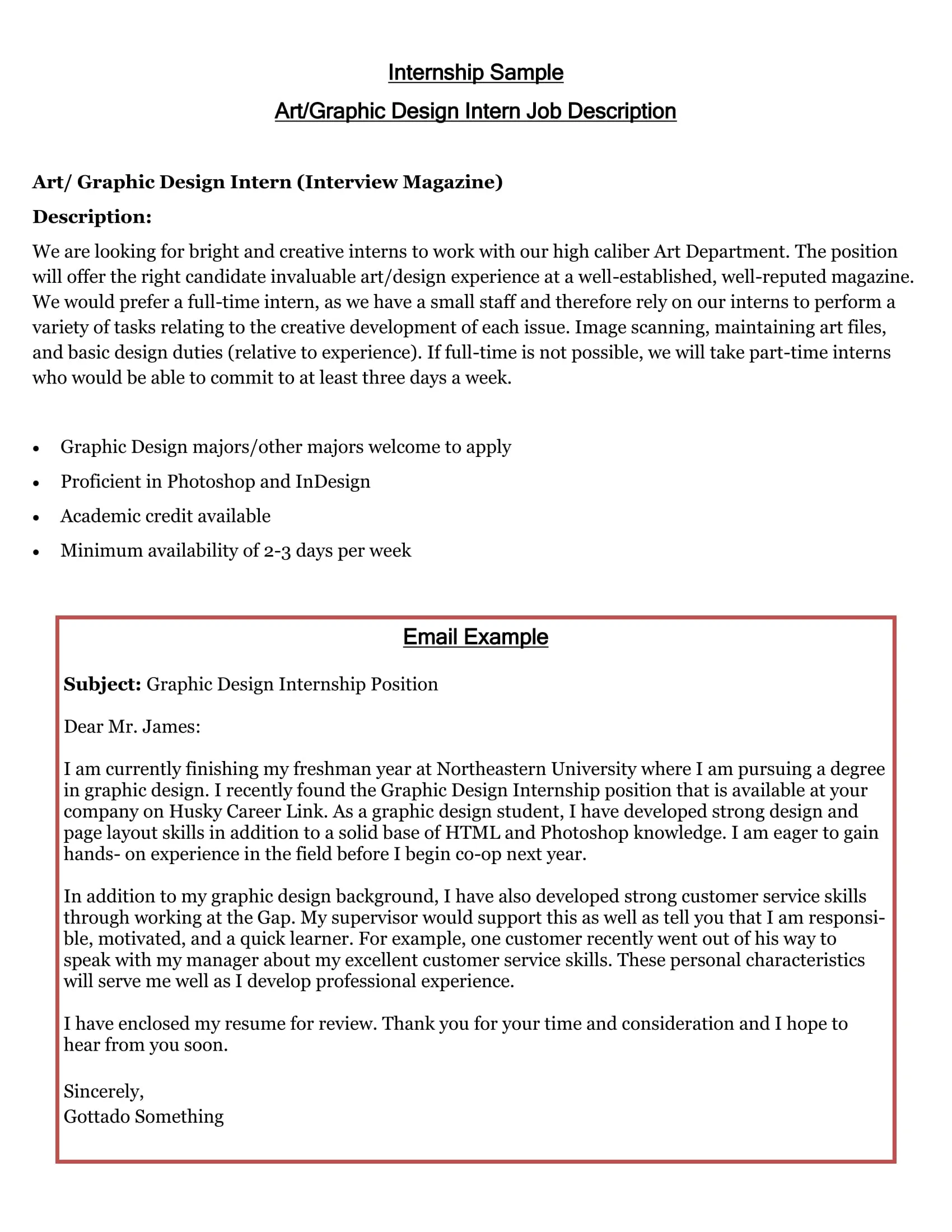
Use the body of your cover letter to elaborate on your skills, experience, and qualifications. Focus on the requirements outlined in the job description and explain how your background aligns with those needs. Use specific examples to demonstrate your accomplishments and quantify your results whenever possible. Show, don’t just tell, the hiring manager why you’re a great fit. Illustrate your understanding of the company’s needs and how you can contribute to their goals. Keep it concise, focused, and easy to read.
Closing Paragraph Call to Action
End your cover letter with a strong call to action. Reiterate your interest in the internship and express your enthusiasm for an interview. Thank the hiring manager for their time and consideration. Provide your contact information again and express your eagerness to discuss your qualifications further. Make it clear that you are ready and willing to take the next step.
Powerful Examples Internship Cover Letters
Example 1 The Enthusiastic Student
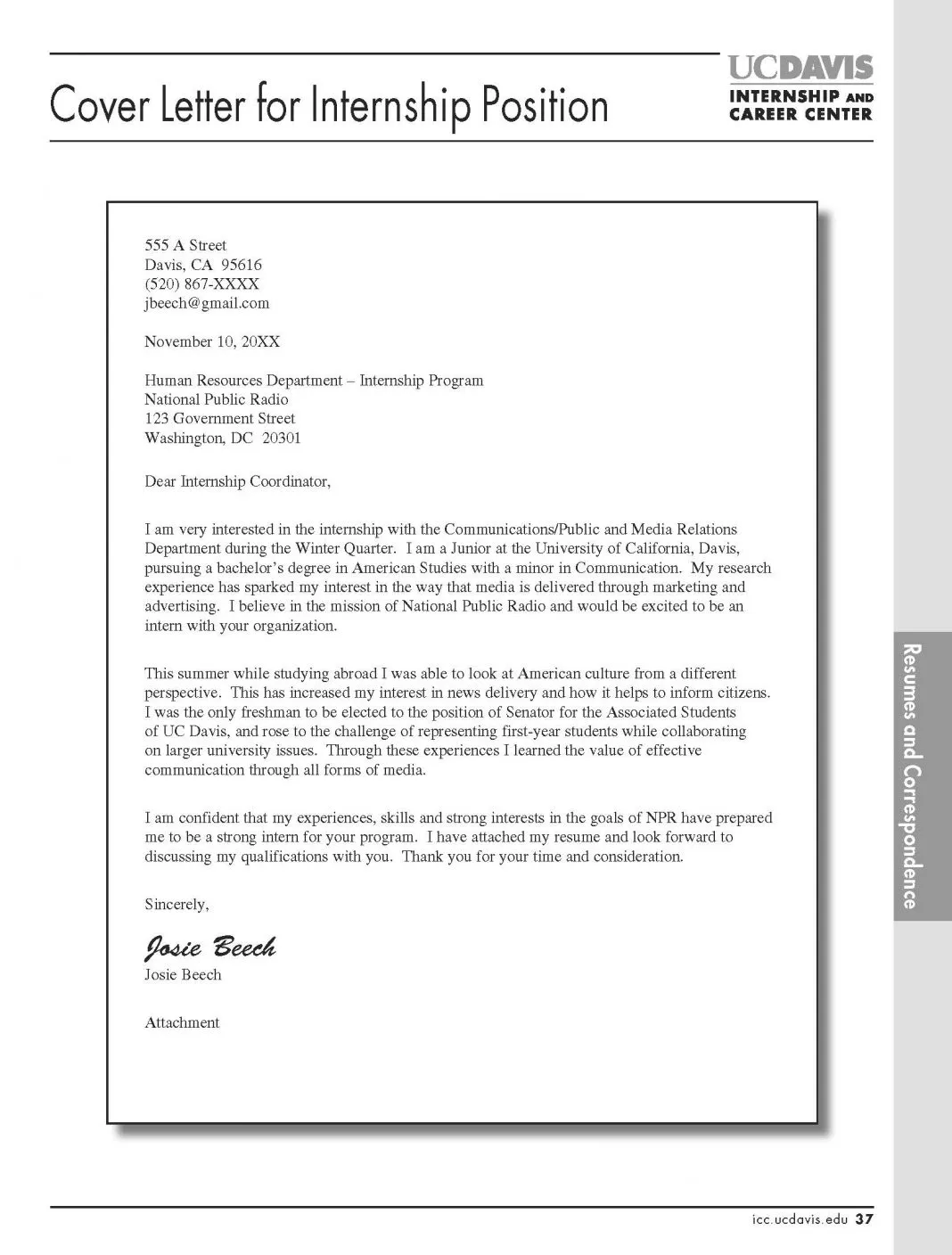
Dear [Hiring Manager Name],
I am writing to express my enthusiastic interest in the Marketing Intern position at [Company Name], as advertised on [Platform]. As a highly motivated marketing student at [University Name] with a passion for digital marketing, I am confident I can significantly contribute to your team. In my coursework, I have honed my skills in social media management, content creation, and SEO optimization. For example, during a project on [Course Name], I increased engagement by 25% by implementing a new content strategy. I am particularly drawn to [Company Name]’s innovative approach to [specific company project]. I am eager to apply my skills and learn from your experienced team. Thank you for your time and consideration. I look forward to the possibility of discussing my qualifications further. Sincerely, [Your Name]
Example 2 The Experienced Intern
Dear [Hiring Manager Name],
I am writing to apply for the Software Engineering Intern position at [Company Name]. Having completed a previous internship at [Previous Company], where I gained hands-on experience with [specific technologies], I am now looking to further develop my skills within a dynamic environment. During my time at [Previous Company], I contributed to [specific project] and improved the code efficiency by 15%. My strong background in programming languages such as Java, combined with my understanding of software development principles, enables me to contribute to your team. I am impressed by [Company Name]’s [company project]. I am excited about the opportunity to learn from the experienced professionals and contribute to cutting-edge projects. Thank you for considering my application. I look forward to the opportunity to speak with you. Sincerely, [Your Name]
Example 3 The Career Changer
Dear [Hiring Manager Name],
I am writing to express my keen interest in the [Field] Internship at [Company Name]. After a successful career in [Previous Field], I have decided to transition to [New Field], pursuing a passion I’ve held for many years. My experience in [Previous Field] provided me with invaluable transferable skills, including project management, data analysis, and strong communication skills. Furthermore, I recently completed [Relevant Course/Certification], where I gained practical skills in [specific skills]. I am impressed by [Company Name]’s commitment to [company’s values], which aligns perfectly with my career goals. I am eager to leverage my skills and learn from the best in the industry. Thank you for considering my application, and I look forward to the opportunity to speak with you. Sincerely, [Your Name]
Common Mistakes to Avoid
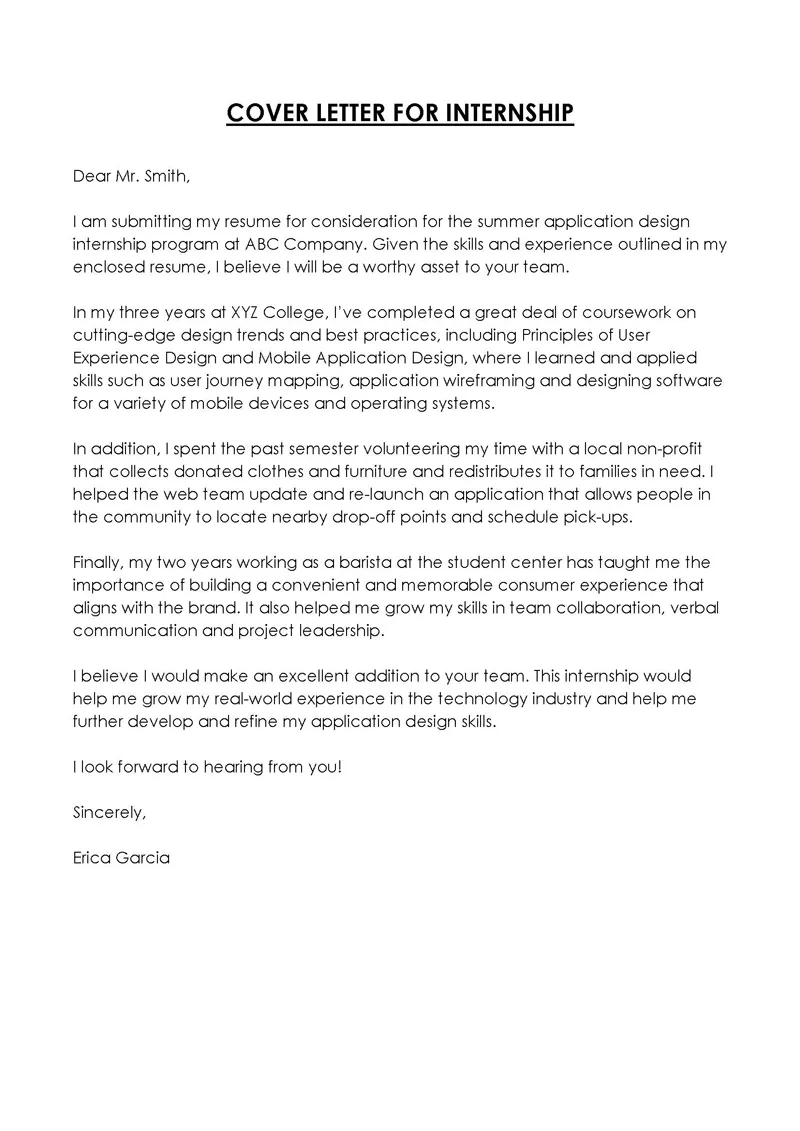
Generic Letters
Avoid sending the same cover letter to multiple companies. Each internship application requires personalization, demonstrating that you’ve researched the specific company and role. Generic letters lack this crucial element and often fail to make a positive impression. Tailor your cover letter to match the specific requirements of the internship and highlight your relevant skills and experience. Use keywords from the job description and tailor your letter to each specific role.
Typos and Grammatical Errors
Proofread your cover letter meticulously. Typos and grammatical errors can undermine your credibility and suggest a lack of attention to detail. Use spell-check and grammar-check tools, and consider having a friend or mentor review your letter for any mistakes. Errors can make you look unprofessional, while a polished cover letter demonstrates your professionalism.
Lack of Research About the Company
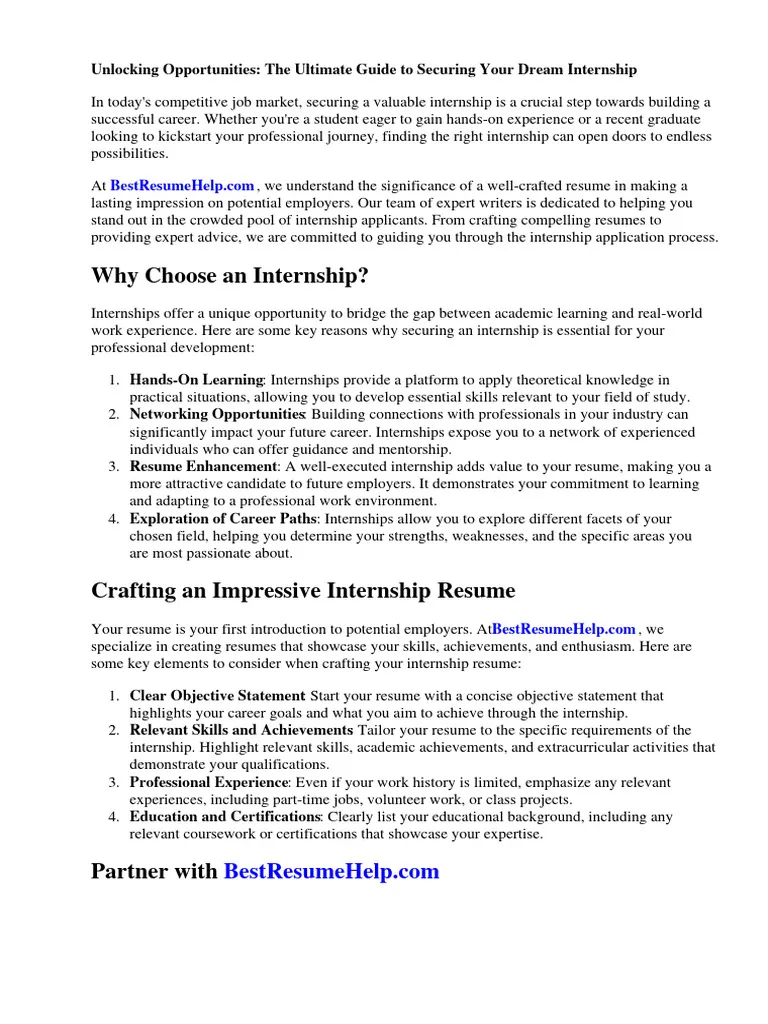
Failing to research the company is a major red flag. Your cover letter should demonstrate that you understand the company’s mission, values, and goals. Visit their website, read recent news articles, and understand what the company does. Demonstrate your understanding by referencing specific projects, initiatives, or aspects of the company that interest you. Doing so shows your genuine interest and makes your application stand out.
Formatting and Presentation Tips
Ensure your cover letter is easy to read. Use a professional font, such as Times New Roman or Arial, and maintain consistent formatting throughout. Use clear headings, bullet points, and white space to break up large blocks of text. Keep your cover letter concise, ideally within one page. Use a clear and professional layout. Ensure your cover letter looks neat, organized, and visually appealing to the hiring manager.
